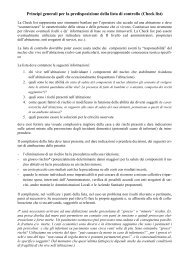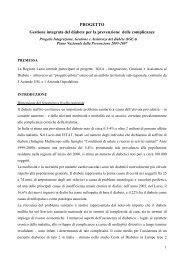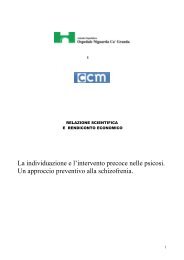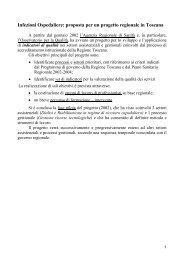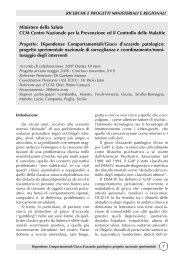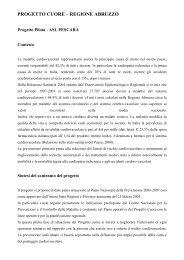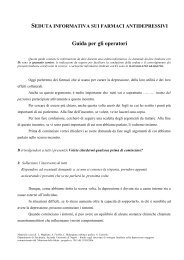Gaining health : analysis of policy development in European ...
Gaining health : analysis of policy development in European ...
Gaining health : analysis of policy development in European ...
Create successful ePaper yourself
Turn your PDF publications into a flip-book with our unique Google optimized e-Paper software.
doctors are not tra<strong>in</strong>ed <strong>in</strong> general practice. A typical <strong>health</strong><br />
post is staffed by a nurse or midwife and provides maternity<br />
care, child <strong>health</strong> care services and immunizations. Rural<br />
<strong>health</strong> services have ceased to function <strong>in</strong> some areas ow<strong>in</strong>g<br />
to a shortage <strong>of</strong> equipment and staff resignations.<br />
In urban areas, large polycl<strong>in</strong>ics provide specialized outpatient<br />
care, but are now also used by people as their first<br />
po<strong>in</strong>t <strong>of</strong> contact with the <strong>health</strong> care system. Previously,<br />
patients had to be referred for specialist care by their<br />
general practitioner (GP), even though GPs were not highly<br />
respected as <strong>health</strong> pr<strong>of</strong>essionals. This referral system is no<br />
longer used. The M<strong>in</strong>istry <strong>of</strong> Health has <strong>in</strong>troduced fees for<br />
those who bypass their GPs but, so far, this dis<strong>in</strong>centive has<br />
had little effect.<br />
Local authorities now own PHC facilities <strong>in</strong> rural areas,<br />
whereas <strong>in</strong> urban areas <strong>health</strong> care facilities are still owned<br />
by the M<strong>in</strong>istry <strong>of</strong> Health. This division <strong>in</strong> the country’s decentralization<br />
<strong>of</strong> <strong>health</strong> services has led to underfunded rural<br />
<strong>health</strong> services and better funded urban <strong>health</strong> services.<br />
Reform <strong>of</strong> the PHC system began <strong>in</strong> 1992, guided by the<br />
EU’s PHARE programme (Assistance for Economic Restructur<strong>in</strong>g<br />
<strong>in</strong> the Countries <strong>of</strong> Central and Eastern Europe),<br />
the World Bank and WHO. PHC facilities rema<strong>in</strong> publicly<br />
owned, with the exception <strong>of</strong> licensed private pharmacies<br />
and dental cl<strong>in</strong>ics. The PHC <strong>policy</strong>, which was developed<br />
<strong>in</strong> 1997 with EU support, states that there should be at<br />
least one <strong>health</strong> care centre <strong>in</strong> each commune and one<br />
<strong>health</strong> post <strong>in</strong> each village. Health centres are supposed to<br />
be physically separate from polycl<strong>in</strong>ics, medical centres and<br />
hospitals. Many <strong>health</strong> centres were renovated and reequipped<br />
dur<strong>in</strong>g 1999/2000, and the M<strong>in</strong>istry <strong>of</strong> Health is<br />
rebuild<strong>in</strong>g others with f<strong>in</strong>ancial assistance from the <strong>European</strong><br />
Commission’s Humanitarian Aid Office (ECHO), the<br />
World Bank and the German Government. The <strong>policy</strong> proposes<br />
that primary care teams have to be led by GPs. The<br />
plann<strong>in</strong>g guidel<strong>in</strong>e is one GP per 2000 <strong>in</strong>habitants <strong>in</strong> urban<br />
areas and one per 1700 <strong>in</strong>habitants <strong>in</strong> rural areas.<br />
The M<strong>in</strong>istry <strong>of</strong> Health, with assistance from donors, has<br />
started <strong>in</strong>tegrat<strong>in</strong>g separate <strong>health</strong> services <strong>in</strong>to PHC teams.<br />
As part <strong>of</strong> this process, tuberculosis prevention services,<br />
which are part <strong>of</strong> a national programme adm<strong>in</strong>istered<br />
through the districts, will also become part <strong>of</strong> the PHC<br />
system. Public <strong>health</strong> and preventive services such as school<br />
<strong>health</strong> and <strong>health</strong> education will also be <strong>in</strong>cluded, along with<br />
maternal and child <strong>health</strong> and family plann<strong>in</strong>g services. Recently,<br />
mental <strong>health</strong> services have been tested at the level<br />
<strong>of</strong> primary care, with the support <strong>of</strong> the Swedish Government<br />
and WHO. A pilot <strong>in</strong>tegration project has been set<br />
up <strong>in</strong> the Tirana Prefecture <strong>in</strong> connection with the <strong>development</strong><br />
<strong>of</strong> its regional <strong>health</strong> authority. The World Bank<br />
is support<strong>in</strong>g this effort. At present, PHC teams have very<br />
limited actual <strong>in</strong>volvement <strong>in</strong> NCD prevention (3).<br />
2. Albania’s approach to develop<strong>in</strong>g policies<br />
to tackle NCD<br />
2.1. How th<strong>in</strong>gs started<br />
In 2003, Albania developed a document on <strong>health</strong> promotion<br />
and disease prevention. In fact the process was <strong>in</strong>itiated<br />
by the World Bank as a condition for a loan. The relevant<br />
Albanian authorities were quite open to the idea but were<br />
not very motivated or conv<strong>in</strong>ced <strong>of</strong> the rationale <strong>of</strong> such<br />
a <strong>policy</strong> measure. Consultants from the London Development<br />
Agency drafted the text <strong>in</strong> cooperation with a small<br />
group <strong>of</strong> <strong>in</strong>ternationally tra<strong>in</strong>ed Albanian experts.<br />
The first draft was considered by the Albanian partners to<br />
be too theoretical and not specific enough for Albania. The<br />
draft<strong>in</strong>g team was requested to prepare a more balanced<br />
and action-oriented document with specific priorities reflect<strong>in</strong>g<br />
the Albanian situation.<br />
Chapter 4<br />
27<br />
Case studies: <strong>policy</strong> <strong>development</strong> <strong>in</strong> countries for tackl<strong>in</strong>g noncommunicable diseases



